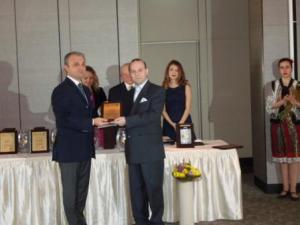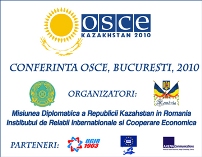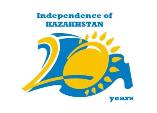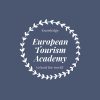We are living through difficult and boisterous time. A period of rapid changes in world economic and political system, a time of powerful crisis that is shaking the fundaments of national states and of national economies and is putting under strain the social protection and all the values of economic neo-liberalism.
In this chaotic period, just a few nations are allowed the luxury of economic and political long time forecast and predictability: China and United States are creating and proposing to their people and foreign partners a long term vision of development and national statehood construction.
In a time of peril and un-certitude, when even a short time economic prediction is considered hazardous, just a few nations are having the will to act as beacons of lights and direction for their region.
In 17th of December 2012 Kazakhstan had enter to this select club of nations, conscientious of their role and position in the continental and world stage by presenting an ambitious, realistic and well carved plan for future of Kazakhstan until 2050.
By the voice of his President, Nursultan Nazarbayev, Kazakhstan had created the prototype of a long term, healthy and stable construction model for the country, the region and the world.
Kazakhstan 2030: weathering the storm and creating a nation.
Kazakhstan it is not at the first step in a managed transition towards a stable and democratic society and a powerful economy.
In 1997 Kazakhstan had already carved the landmarks of his astonishing development by the presidential strategy- Kazakhstan 2030.
Far from being just a window dressing, the strategy for 2030 had proved to be a perfect way for charting Kazakhstan after the independence in the incertitude of nation building and construction of a viable economy.
The program had allowed Kazakhstan to tap into national reserves of oil and gas, to gush out of the enclave country status via the reconstructed Silk Road of energy and trade, to create a modern economy, not depending only on energy resources, to build a huge potential of national intelligence and to foster the economy of knowledge, the base for a XXI century reliable economy.
The long string of economic successes was accompanied in the internal sphere by political stability, based on democratic and open society values, the protection of national and religious minorities.
In the area of external policy, Kazakhstan had gather the powerful laurels of a successful reform project carried out during his Presidency of Organization for Security and Cooperation in Europe. An impressive success was also the unprecedented two year chairmanship of Organization of Islamic Conference that transformed Kazakhstan in a leader of dialogue between Islam and Western world.
The latest major diplomatic achievement of Kazakhstan was the proposal of building an area of security and cooperation in Europe and Asia, launched in September 2012, in Astana, at CICA Conference by President Nursultan Nazarbayev. This latest proposal makes Kazakhstan the promoter of an all-inclusive, intercontinental dialogue, that could transform the political landscape of XXI century.
In the end, Kazakhstan 2030 had proved to be not only a successful strategy for Kazakhstan, but also an example for all the countries of the world on how a nation by the sole fact of building himself, can become a regional and world significant player.
The main pillar of Kazakhstan 2050: understanding of XXI century.
In its world acclaimed book: The Seven Pillars of Wisdom, the famous Lawrence of Arabia had mentioned that: the most important, but also decisive part of a plan is to be in line with the necessity of his time.
Kazakhstan 2050 starts by outlining the fundaments of the world in XXI century. A period of change, of accelerating history, of economic, political and ecological challenges, a world completely different from the world of XX century.
Instead of training to force the reality to enter in the realm of possibility, Kazakhstan 2050 is offering a realistic and practical assessment of the necessities of today world and of the available solutions.
Fallowing his long term tradition, Kazakhstan understands that creating a success story and offering solutions to the world is the best way to serve not only his interest, but also to add value to his place in the world.
Kazakhstan 2050: good news for people of Kazakhstan.
Kazakhstan had become in the last 20 years an abode of peace, inter-ethnic and inter-religious understanding in a troubled world. One of the explanation is undoubtedly the economic success that made the Kazakhstan not only one of the fastest growing economy in the world, but also a top investor destination in the world economy statistics.
Kazakhstan 2050 is providing the basis for this healthy economy to continue his growth process. Investing in social protection and creating a strong internal demand are key factors for a stable rate of growth. Modernizing the economic potential, investing in new technologies are policy that will insure the world competitiveness of Kazakhstan national economy and the creation of a knowledge based economy are also a profitable long term investment.
The modern economy is based on technological transfer and Kazakhstan is becoming a champion in modernizing the basis of his economy via technology transfer and more important, Kazakhstan educational system mixed with the accent on entrepreneurship in economic development is creating the base for a managerial revolution, that will put Kazakhstan among the top economy`s of the world in term of creativity and intelligence incorporated in economic production.
Extremely interesting it is also the concept of a Kazakhstan patriotism. Instead of playing the card of nationalism or chauvinism, President Nursultan Nazarbayev is calling for the tradition, language and equality to blend into a new and successful Kazakh: a person well educated, wealthy , healthy enjoying the benefits of a modern state and administration and a state of the art medical system.
Kazakhstan is promising to put at the core of his foundation plan for 2050 the individual and his chances to prevail in a complex XXI century.
From Kazakhstan to the world. From world to Kazakhstan.
One of the keys of Kazakhstan national and international success was understanding that Kazakhstan could not evolve alone in the world, but always must stay in touch and be an intricate part of the world evolutions. There are many examples that support this conjecture in Kazakhstan two decades of independence story.
Kazakhstan economic miracle was built on partnership with western companies and oil extraction technology, but also on political negotiation with Russia on Caspian Sea exploration.
The Astana Expo 2017 will also be a proof of the lesson of mutual profit that Kazakhstan is offering to the world. Kazakhstan management of energy, the lessons of ecology and energy for a future, of environment protection, are going to be beneficial for the world economy and for the generations to come. This is just a new illustration of the Kazakhstan concept of successful quest for global significance.
Kazakhstan economic development had transformed the country in a major player in the development of Asia and Europe. Kazakhstan 2050 promises to continue this wise policy: from Kazakhstan to the world, from world to Kazakhstan, creating a synergy that could only beneficial for all the world nations.
Now the lessons of Kazakhstan 2050 are available for everybody: an example of a society of free people building a country for the future, not in isolation or competition, but in harmony with the world nations. In the concert of nations Kazakhstan is ushering in a new tone: a tone of hope.
Professor dr. Anton Caragea MA, FINS, Dr.Hc




 Posted by antoncaragea
Posted by antoncaragea 




















You must be logged in to post a comment.